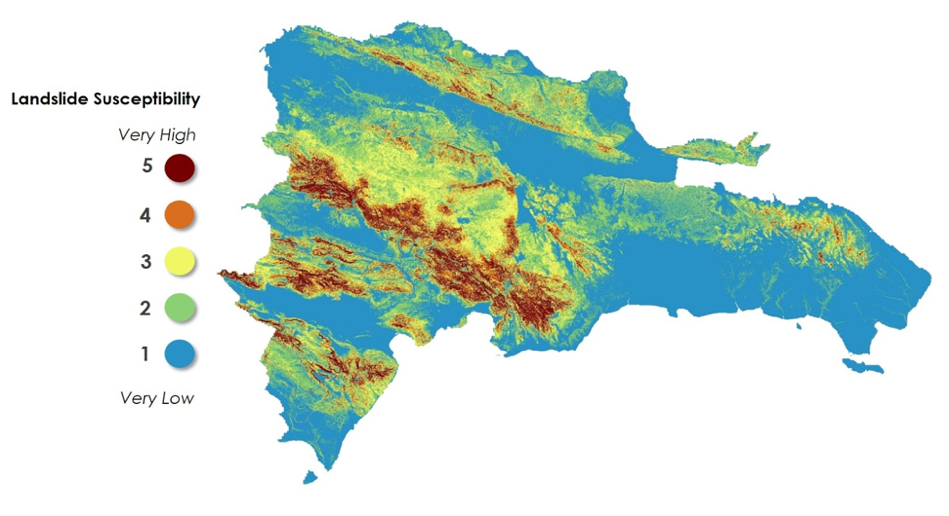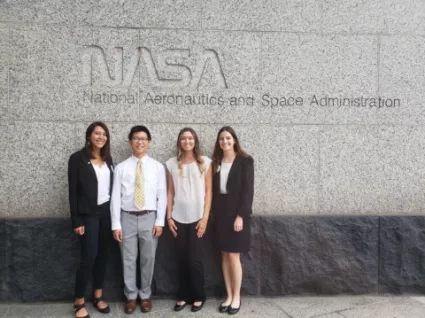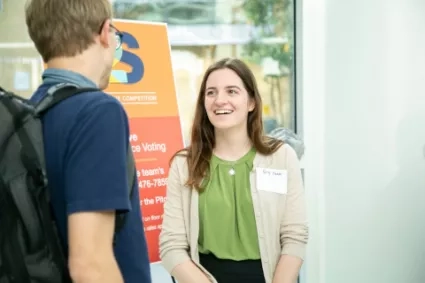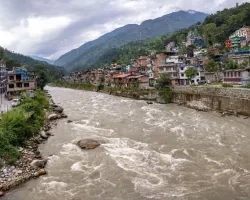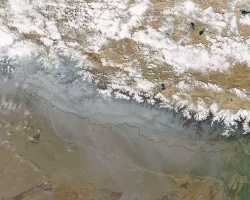Gigi Pavur, a 2019 DEVELOP participant and former NASA Headquarters intern, is one of eight grand prize winners of the 2019 American Geophysical Union (AGU) Data Visualization and Storytelling Competition for her DEVELOP team’s landslide susceptibility mapping project.
The project helps identify potential landslides in the Dominican Republic and surrounding Caribbean islands in near real-time. Pavur, along with team members Sarah Aldama, Chelsea Dandridge and Kyung “Robin” Kim, worked with two government agencies in the Dominican Republic — Servicio Geológico Nacional (SGN) and Oficina Nacional de Meteorología (ONAMET) — to create local landslide susceptibility maps using NASA Earth observations. Once the maps were created, the team provides them as inputs to a computer model that assesses the probability of a landslide happening. Insurance companies, international aid organizations, emergency response groups and others use this NASA computer model, called the Landslide Hazard Assessment for Situational Awareness (LHASA), to independently monitor near real-time landslide potential.
It was during her time with DEVELOP that she learned about the AGU competition.
“There’s actually a remarkably long history of DEVELOPers winning the grand prize,” she said. “I’m not the first DEVELOPer to win it, and I’d be very surprised if I’m the last.”
DEVELOP, a part of NASA’s Earth Applied Sciences Program, addresses environmental and public policy issues through interdisciplinary research projects that apply NASA Earth observations to community concerns. It also seeks to train early-career scientists on how best to address various challenges and build links to many different partner organizations.
The AGU competition was open to two- and four-year undergraduate and graduate students. This year’s competition winners each received travel grants funded by AGU, complimentary registration to the 2019 AGU fall meeting in San Francisco, CA and the opportunity to present their story on the NASA Hyperwall. The competition is funded by a grant from NASA.
For Pavur, this will be her first time attending an AGU meeting.
“I’m feeling a little nervous but mostly really excited for the opportunity for two reasons,” she said. “First, for the opportunity to go, and second, for the opportunity to talk about my incredible experience with DEVELOP to such a big Earth science audience.”
However, this isn’t Pavur’s first experience with NASA. In the summer of 2018, Pavur found an opening for a summer science internship at NASA Headquarters in Washington, DC. She pulled together her application and was chosen to work with the Applied Sciences Program’s team.
“Practically every morning I woke up that summer and thought, ‘How did I get so lucky?’” Pavur said. “It’s influenced and changed my career goals and aspirations. I want to go to graduate school because of it and really dive into the applications of Earth observations.”
While at NASA Headquarters, Pavur met passionate Earth scientists and discovered careers in the field she didn’t know existed. Before her internship, Pavur was unaware that NASA uses satellites to look at natural disasters — now she wants to make it her career. And it was during her internship that Pavur learned about DEVELOP. She attended the 2018 Annual Earth Science Applications Showcase and had the opportunity to hear from DEVELOPers across the country. Listening to their experience and watching their presentations, she knew she wanted to apply.
“It was one of those opportunities I don’t think I would have gotten in the classroom or even in another internship,” she said. “DEVELOP taught me how to learn outside of the classroom."
Keith Gaddis is the deputy program scientist for the NASA Earth Science Biological Diversity and Ecological Forecasting programs at NASA Headquarters. He worked closely with Pavur during her internship.
“Gigi was an incredible addition to the NASA Headquarters team,“ he said. “Her time with NASA HQ, DEVELOP and now as an AGU award winner is a testament to her work ethic and also a powerful example of what is possible for the next generation of Earth scientists.”
Pavur, a senior at Georgia Tech majoring in Earth and atmospheric sciences, plans to graduate in May 2020 and is currently applying to graduate programs. While she’s still figuring out what comes next, Pavur enjoys playing violin in the Georgia Tech Symphony Orchestra and cracking cheesy puns.
“I made way too many space jokes while I was at NASA,” she said. “My time there was truly out of this world.”
All of the Data Visualization and Storytelling competition talks will be held from 12-1:15 pm on Tuesday, December 10, and Wednesday, December 11. Pavur will be presenting on Tuesday.
